-
 Bitcoin
Bitcoin $82,760.9284
-0.83% -
 Ethereum
Ethereum $1,896.6191
-0.05% -
 Tether USDt
Tether USDt $1.0001
0.02% -
 XRP
XRP $2.3190
0.84% -
 BNB
BNB $631.2759
5.03% -
 Solana
Solana $125.8882
-2.54% -
 USDC
USDC $1.0000
0.01% -
 Dogecoin
Dogecoin $0.1707
1.36% -
 Cardano
Cardano $0.7186
1.93% -
 TRON
TRON $0.2173
1.23% -
 Pi
Pi $1.3288
-5.22% -
 UNUS SED LEO
UNUS SED LEO $9.8283
0.07% -
 Chainlink
Chainlink $13.6331
0.75% -
 Toncoin
Toncoin $3.4521
2.17% -
 Stellar
Stellar $0.2729
2.92% -
 Hedera
Hedera $0.1899
1.24% -
 Avalanche
Avalanche $18.2736
-1.17% -
 Shiba Inu
Shiba Inu $0.0...01281
0.66% -
 Sui
Sui $2.2719
1.56% -
 Litecoin
Litecoin $92.7372
3.50% -
 Polkadot
Polkadot $4.3515
2.43% -
 MANTRA
MANTRA $6.8718
3.12% -
 Bitcoin Cash
Bitcoin Cash $338.9442
2.50% -
 Ethena USDe
Ethena USDe $0.9996
-0.01% -
 Dai
Dai $1.0001
0.00% -
 Bitget Token
Bitget Token $4.4205
0.62% -
 Hyperliquid
Hyperliquid $13.5146
0.63% -
 Monero
Monero $211.4265
0.66% -
 Uniswap
Uniswap $6.1381
1.68% -
 Aptos
Aptos $5.3644
3.44%
What are the characteristics of blockchain wallet addresses?
Blockchain wallet addresses offer a secure and transparent way to manage cryptocurrencies, providing users with decentralized control, pseudonymity, and immutable transaction records.
Dec 21, 2024 at 12:07 pm

Key Points
- Decentralization: Addresses on a blockchain are decentralized, meaning that they are not controlled by any single entity or custodian. This differs from traditional banking accounts, which are managed by banks and subject to their rules and regulations.
- Transparency: Blockchain transactions are transparent and immutable, which means that they can be viewed and verified by anyone. The addresses involved in transactions are also publicly available, providing a degree of accountability and transparency.
- Pseudonymity: Addresses are pseudonymous, meaning that they are not directly linked to a user's real identity. This allows users to maintain anonymity while still using the blockchain.
- Security: Addresses are cryptographically secure, providing robust protection against unauthorized access or theft. They incorporate advanced cryptographic algorithms to ensure the integrity and safety of the underlying assets.
Characteristics of Blockchain Wallet Addresses
1. Decentralized
Blockchain wallet addresses, unlike traditional bank account numbers, are not controlled or managed by any central authority. Instead, they exist independently on the blockchain network, which is a distributed and decentralized ledger system. This decentralized nature eliminates the need for trusted intermediaries and provides users with complete control over their funds.
2. Transparency
Due to the inherent transparency of blockchain transactions, wallet addresses are also publicly viewable. Every transaction, including sender and recipient addresses, amounts transferred, and timestamps, is recorded on the blockchain and accessible to anyone with an internet connection. This openness promotes accountability and transparency within the cryptocurrency ecosystem.
3. Pseudonymity
While blockchain addresses are transparent and publicly visible, they are not directly linked to a user's real identity. This pseudonymity allows users to interact with the blockchain network without revealing their personal information. Users can create multiple addresses without disclosing their ownership, enabling a degree of privacy in their financial transactions.
4. Security
Blockchain wallet addresses are cryptographically secure and designed to protect user funds from unauthorized access or theft. They utilize advanced cryptographic algorithms, such as elliptic curve cryptography (ECC) and hash functions, to generate unique addresses that are virtually impossible to replicate or compromise. This robust security infrastructure helps ensure the integrity and safety of the underlying assets.
5. Format and Structure
Blockchain wallet addresses adhere to specific formats and structures, depending on the underlying blockchain protocol. For instance, Bitcoin addresses typically start with the prefix "1" or "3" and consist of a combination of letters and numbers. Ethereum addresses, on the other hand, are prefixed with "0x" and are composed of 40 hexadecimal characters representing the public key of the wallet.
6. Types of Addresses
Different types of wallet addresses exist, each serving specific purposes. Some common address types include:
- Standard Addresses: Used for regular transactions and storing cryptocurrencies.
- Stealth Addresses: Offer enhanced privacy by generating a unique address for each transaction.
- Multi-Signature Addresses: Require multiple signatures for authorizing transactions, enhancing security and preventing unauthorized access.
- Burn Addresses: Addresses specifically designed for sending tokens to be destroyed or removed from circulation.
7. Importance of Managing Private Keys
The security of blockchain wallet addresses is closely tied to the management of private keys. Private keys are confidential codes that enable users to access their cryptocurrencies and authorize transactions. It is crucial to keep private keys safe and secure to prevent unauthorized access to funds.
8. Avoid Address Reuse
Reusing the same blockchain wallet address for multiple transactions is not recommended for privacy and security reasons. It can increase the risk of revealing the ownership of multiple addresses and make transactions more easily traceable.
9. Cultural Adoption
Beyond their technical aspects, blockchain wallet addresses have also gained cultural significance within the cryptocurrency community. They often serve as identifiers and usernames for individuals and organizations actively involved in the crypto space.
FAQs
Q: Are blockchain wallet addresses permanent?
A: Yes, blockchain wallet addresses are permanent once created and cannot be changed.
Q: Can you send different currencies to the same address?
A: No, different cryptocurrencies have different types of addresses, and it is not recommended to send different assets to the same address.
Q: Why do multiple users share a blockchain wallet address?
A: This is typically done for multi-signature wallets where different parties need to authorize transactions.
Q: Can exchanges have blockchain wallet addresses?
A: Yes, exchanges maintain wallet addresses to hold customer funds. These addresses serve as a custodian for deposited cryptocurrencies.
Disclaimer:info@kdj.com
The information provided is not trading advice. kdj.com does not assume any responsibility for any investments made based on the information provided in this article. Cryptocurrencies are highly volatile and it is highly recommended that you invest with caution after thorough research!
If you believe that the content used on this website infringes your copyright, please contact us immediately (info@kdj.com) and we will delete it promptly.
- The Latest Memecoin Backed by CZ !
- 2025-03-17 23:35:57
- Solana (SOL) Marks Its 5th Anniversary Today with Over 400 Billion Transactions Processed
- 2025-03-17 23:35:57
- 21Shares Liquidates Two Bitcoin and Ethereum Futures ETFs
- 2025-03-17 23:35:57
- The SEC is potentially withdrawing legal action against crypto firms, including Ripple.
- 2025-03-17 23:30:57
- HyperBearWhale takes a $330M leveraged bearish bet on bitcoin (BTC) and went viral
- 2025-03-17 23:30:57
- Infinaeon Token Airdrop Date Confirmed by Team, INF Presale Enters Final Stage
- 2025-03-17 23:30:57
Related knowledge
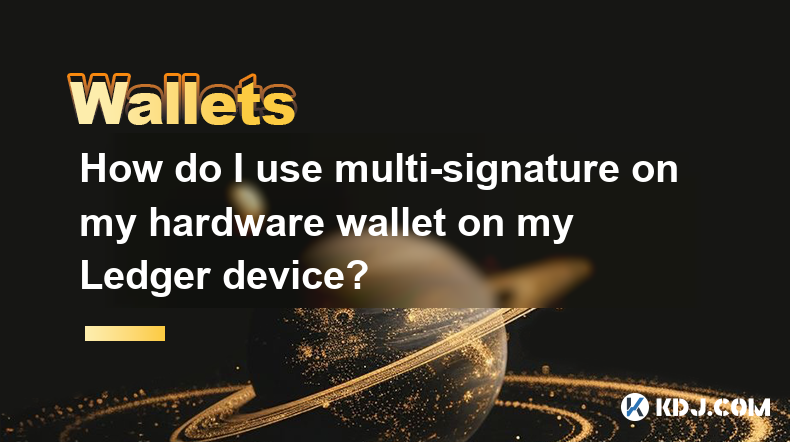
How do I use multi-signature on my hardware wallet on my Ledger device?
Mar 17,2025 at 01:36am
Key Points:Multi-signature (multisig) wallets enhance security by requiring multiple approvals for transactions.Ledger devices support multisig through compatible wallets and specific configurations.Setting up multisig involves generating multiple keys and configuring the wallet accordingly.Understanding the intricacies of threshold signatures is crucia...
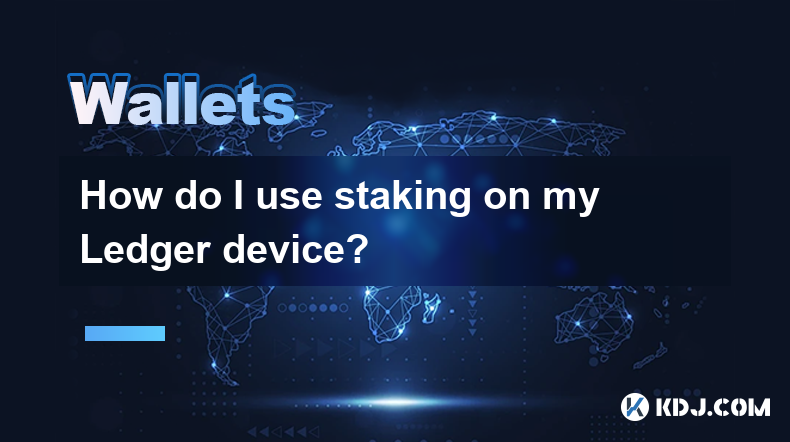
How do I use staking on my Ledger device?
Mar 17,2025 at 12:41pm
Key Points:Ledger devices offer a secure way to stake various cryptocurrencies. However, the process varies depending on the coin and the chosen staking provider.You'll generally need a Ledger Live account and the correct application installed on your device.Understanding the risks associated with staking, such as potential slashing, is crucial before p...
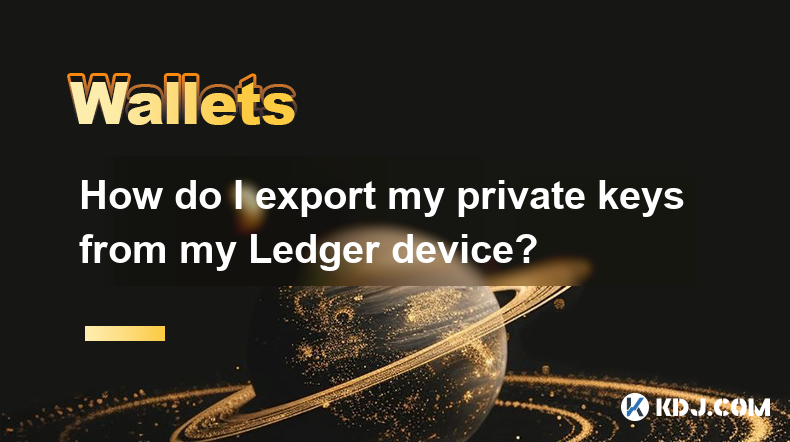
How do I export my private keys from my Ledger device?
Mar 17,2025 at 02:30pm
Key Points:Ledger devices do not directly "export" private keys in the traditional sense. The private keys are never revealed or accessible outside the secure element of the device.You can access and use your private keys indirectly through the device's interaction with your chosen wallet software.The process involves using your Ledger device with compa...
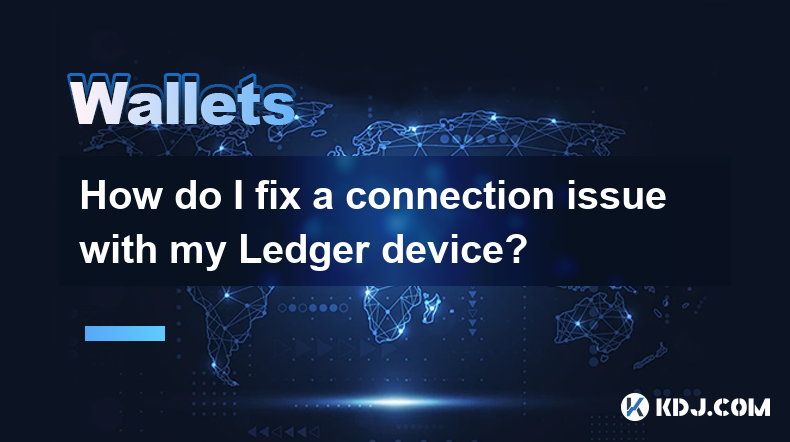
How do I fix a connection issue with my Ledger device?
Mar 16,2025 at 08:26am
Key Points:Troubleshooting Ledger connection issues often involves checking the device's charge, the USB cable, and the computer's USB ports.Software updates on both the Ledger device and its associated computer applications are crucial for optimal functionality and connection stability.Correctly installing the Ledger Live application and ensuring its c...
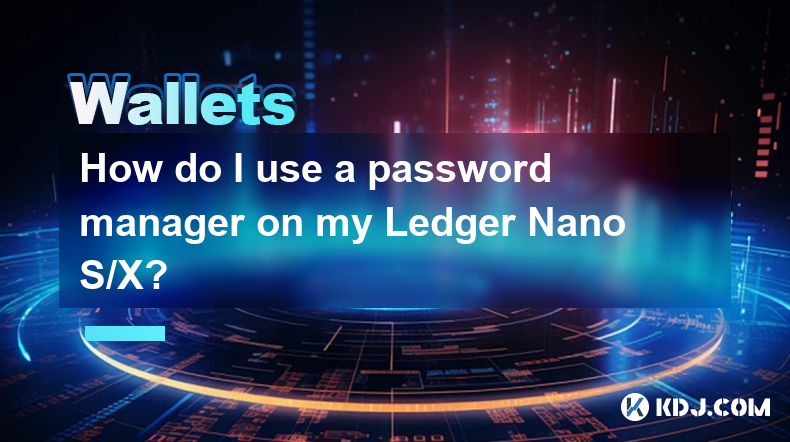
How do I use a password manager on my Ledger Nano S/X?
Mar 16,2025 at 09:25pm
Key Points:Ledger devices do not directly integrate with password managers. Their security model prioritizes offline key storage.You can use a password manager for your computer passwords, but not for your Ledger device seed phrase or PIN.Storing your Ledger PIN in a password manager is highly discouraged due to security risks.Strong, unique PINs and se...
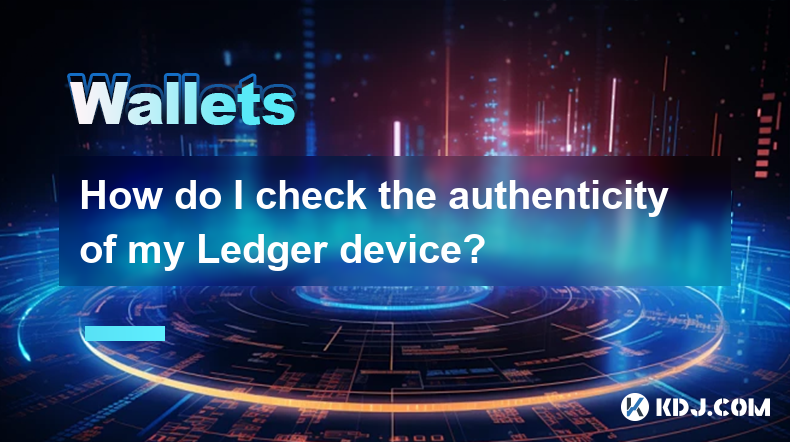
How do I check the authenticity of my Ledger device?
Mar 17,2025 at 02:45pm
Key Points:Verifying your Ledger device's authenticity involves checking for several security features both on the device itself and through Ledger's official website.The packaging and the device itself contain unique identifiers that can be verified.Ledger's website provides tools to confirm the authenticity of your device and its bootloader.Understand...

How do I use multi-signature on my hardware wallet on my Ledger device?
Mar 17,2025 at 01:36am
Key Points:Multi-signature (multisig) wallets enhance security by requiring multiple approvals for transactions.Ledger devices support multisig through compatible wallets and specific configurations.Setting up multisig involves generating multiple keys and configuring the wallet accordingly.Understanding the intricacies of threshold signatures is crucia...

How do I use staking on my Ledger device?
Mar 17,2025 at 12:41pm
Key Points:Ledger devices offer a secure way to stake various cryptocurrencies. However, the process varies depending on the coin and the chosen staking provider.You'll generally need a Ledger Live account and the correct application installed on your device.Understanding the risks associated with staking, such as potential slashing, is crucial before p...

How do I export my private keys from my Ledger device?
Mar 17,2025 at 02:30pm
Key Points:Ledger devices do not directly "export" private keys in the traditional sense. The private keys are never revealed or accessible outside the secure element of the device.You can access and use your private keys indirectly through the device's interaction with your chosen wallet software.The process involves using your Ledger device with compa...

How do I fix a connection issue with my Ledger device?
Mar 16,2025 at 08:26am
Key Points:Troubleshooting Ledger connection issues often involves checking the device's charge, the USB cable, and the computer's USB ports.Software updates on both the Ledger device and its associated computer applications are crucial for optimal functionality and connection stability.Correctly installing the Ledger Live application and ensuring its c...

How do I use a password manager on my Ledger Nano S/X?
Mar 16,2025 at 09:25pm
Key Points:Ledger devices do not directly integrate with password managers. Their security model prioritizes offline key storage.You can use a password manager for your computer passwords, but not for your Ledger device seed phrase or PIN.Storing your Ledger PIN in a password manager is highly discouraged due to security risks.Strong, unique PINs and se...

How do I check the authenticity of my Ledger device?
Mar 17,2025 at 02:45pm
Key Points:Verifying your Ledger device's authenticity involves checking for several security features both on the device itself and through Ledger's official website.The packaging and the device itself contain unique identifiers that can be verified.Ledger's website provides tools to confirm the authenticity of your device and its bootloader.Understand...
See all articles






















































































